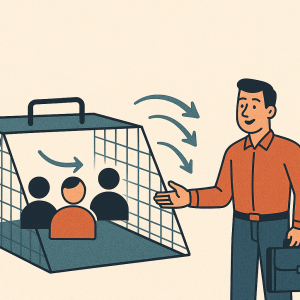
In sales, people talk about businesses falling into two main categories: hunters and farmers. Each approach has its strengths, but we’ve realized that we use a third, less-talked-about category: trappers.
(By the way, I’m using “trapping” as a metaphor here – I’m not advocating for any kind of inhumane trapping of animals! A kinder example is the trapping used on Kauai to trap, spay/neuter, and return feral cats to their wild environment. This reduces the population of feral cats all over the island, and their impact on native wildlife.)
1. The Hunter: Chasing Down Leads
Hunters are relentless in pursuing new clients, making cold calls, and chasing down leads. They thrive on high-energy sales tactics and aggressive prospecting. This is the kind of business where the salesperson gets to “ring a bell” to announce they’ve made a sale. While this can be effective in some industries, we’ve found it too inefficient for our business. The time and effort required don’t yield the results we need, and chasing down leads that aren’t the right fit wastes valuable resources.
2. The Farmer: Cultivating Long-Term Relationships
Farmers, on the other hand, nurture long-term relationships with existing customers, cultivating repeat business. They’re often known providers in their industry, so they don’t have to introduce themselves to new clients – those potential clients are already very aware of them. The farming approach is essential for building loyalty and deepening customer relationships over time. We do have some steady clients who continue to work with us on multiple projects, but not enough to drive the level of growth we aim for. Farming requires a steady stream of large customers who provide ongoing work, and while we value our repeat business, we also need a way to attract new clients who are ready to engage with us.
3. The Trapper: Attracting the Right Clients
Then there are trappers. Instead of chasing or cultivating, trappers attract. Through marketing and advertising, we position ourselves so that potential clients—those who already know they have a problem—find and contact us. Our job is to demonstrate that we are the right partner to solve their issues, without us pressuring or convincing them to do the project. In fact, during our initial consult we often ask about off-the-shelf software that they might be able to use instead of a custom application. This approach allows us to focus on delivering value and building trust from the very first interaction, ensuring that when a client talks with us, we are both invested in finding the right solution.
Why Trapping Works for J Street Technology
At J Street Technology, being a trapper aligns perfectly with our customer-centered approach. We value partnerships over transactions. Our team isn’t just here to write code—we’re here to build trust, solve real business problems, and make sure our solutions truly support our clients. That’s why when we begin working with you, we immerse ourselves completely in your company and industry. We strive to understand your processes, and the “why” behind your requirements. By truly understanding our clients’ challenges, we can craft solutions that not only address immediate needs but also support long-term success.
How We Attract and Support Clients
Transparency, continuous collaboration, and business support is at the core of how we work. By refining our messaging, optimizing our online presence, and sharing insightful content, we attract clients who are actively seeking solutions. This means better alignment between what we offer and what they need, leading to stronger partnerships and more successful outcomes.
The Key is Trust
When clients come to us, they know we have the expertise, the process, and the commitment to help them succeed. That’s why our marketing and outreach efforts focus on education, thought leadership, and clear value propositions. We don’t just sell programming by the hour—we provide solutions that make a real difference in how businesses operate.
What’s Your Approach?
What method does your company use to land new customers? Are you a hunter, a farmer, or a trapper?
